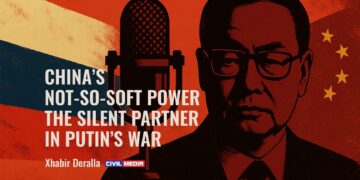Nestle is a Swiss giant multinational food and beverage company. With net revenues of 22.26 billion euros in 2021 alone, Nestle has long been considered the largest food and beverage company in the world. According to Wikipedia, their products include baby food, bottled water, breakfast cereals, coffee and tea, confectionary, dairy products, ice cream, frozen food, pet food and snacks.
Twenty-nine of its brands alone have sales of over 1 billion euros annually, and the company has more than 8,000 brands. It has 447 factories in 194 countries and employs around 333,000 people. They are also considered one of the best employers in Europe and sponsor numerous civil society activities and projects. But not everything is as it seems.
This company has constantly been followed by problematic scandals for decades that have shocked the world public, while activists around the world have often called for boycotting the products of this company.
Nestle has refused to close its business in Russia, claiming that it doesn’t profit in the country that has carried out brutal aggression against Ukraine and has ferociously endangered world peace. This action by the company has triggered a wave of discontent and calls for a boycott around the world, including also by its home country, Switzerland. This is not the first scandal linked to this company with a long “dossier” of unethical practices, whose only goal is profit at any cost. The dossier of big scandals linked to Nestle over the past four and more decades is quite “big”.
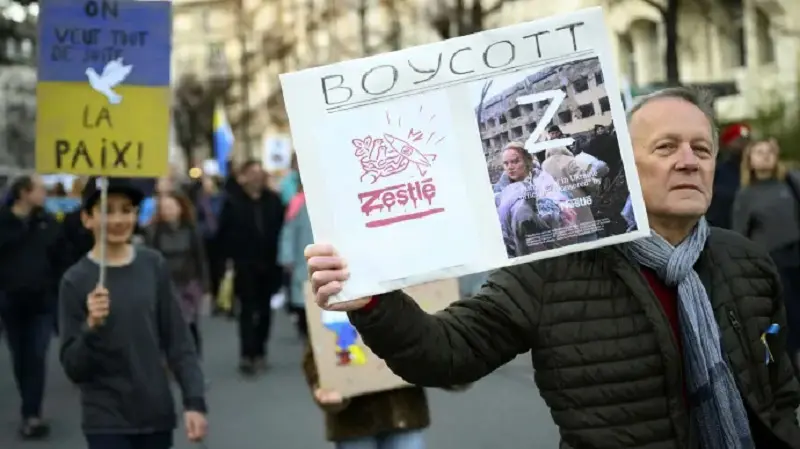
Protests against the Russian aggression against Ukraine, Lausanne, Switzerland, March, 2022 (Laurent Gillieron/EPA-EFE)
Use of child slaves in Africa
The chocolate industry has its own dark side. The disturbing documentary film “The Dark Side of Chocolate” testifies to this, which investigates the inhumane practices in Africa that are carried out by the largest chocolate producers in the world, among which the largest is Nestle. Among else, this industry will stop at nothing in the pursuit of profit.
The film reveals unimaginable brutal exploitation of child labor, often even with children who have been kidnapped and later used as slaves in factories for manufacturing raw materials for the chocolate of world companies for manufacturing chocolates.
Use of child slaves in Thailand
The use of child slaves in Thailand for the production of Nestlé’s products is the darkest part of the “dossier” of this company. Workers in the Thai part of the company for manufacturing pet food are brought from Burma and Cambodia.
One Burmese worker describes the working conditions: “Sometimes the net is too heavy, and so it pulls the workers in the water and they simply disappear. When someone dies, that person is thrown in the water”. Among the workers are also many children.
The Nestle company conducted its own investigation and published these results, probably to overtake the journalistic investigations and announced that it would implement more humane practices for labor protection of workers. It’s known that the investigation of the Associated Press contributed to rescuing 2,000 Thai fishermen from the inhumane working conditions.
The “principled” demands of Ethiopia
Nestle is strictly keeping to its “principles”, which are nothing but a race for profit. Hence, when in the 1970s the dictatorial military regime of Ethiopia seized all foreign property in the country, Nestle fell “short” of about 5.5 million euros.
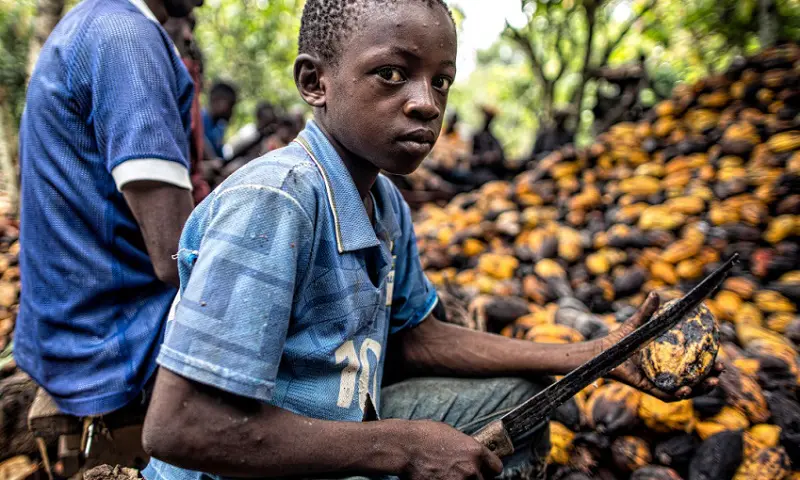
Children in poor countries around the world working for Nestle and other multinational companies in extremely difficult and inhumane conditions. Often, they are also slaves to the underground that uses them to work for large companies.
The company insistently demanded those assets from the Ethiopian government even during the famous Ethiopian famine in 1984 that took 1 million lives. Under the pressure of the world public, in 2020 Nestle finally agreed to reduce the debt to 1.36 million euros that it promised to reinvest in the country. According to the company that last year alone had revenues in the amount of 22 billion euros, it’s not about the money, but about the “principles”.
Baby formulas better than breast milk?
The baby formulas scandal goes back to 1977, when the company was accused of manipulating women who had given birth. In its campaigns, Nestle was convincing the public that the formulas are better than breast milk, so many women who had given birth around the world gave up their milk, giving preference to Nestlé’s formula.
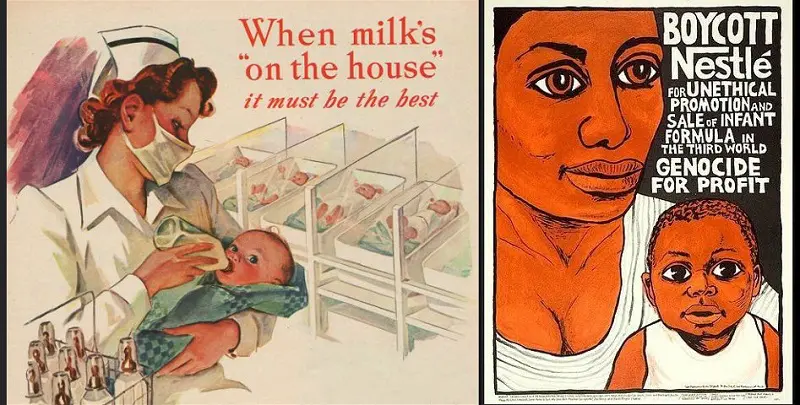
When the milk is “from home”, it has to be the best – was one of the advertisements with which Nestle at one time was convincing mothers to give up their milk and to give Nestlé’s baby formula to their children. Activists around the world then and now call for boycotting Nestlé’s products because the company behaves unethically and runs campaigns with inaccurate information on its products.
“Boycott Nestle due to unethical promotion and sale of infant formula in Third World countries – GENOCUDE FOR PROFIT” – is written on one of the posters in the anti-Nestle campaigns.
Water is a human right, but not for Nestle
Water is a human right, but Nestle is persistently privatizing water supplies for its commercial needs around the world. The company’s stance is that water is used irresponsibly precisely because it’s treated as a human right. According to that logic of the company, water should be privatized and thus introduce order in the consumption of the most important natural resource. Such policy would lead to depriving the poor of the right to free use of water.
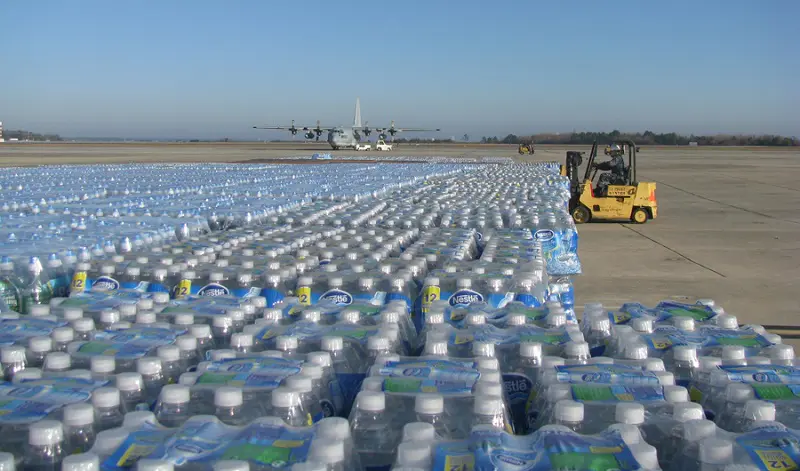
Nestle bottled water. The company itself admitted that it wastes 30% of the water supplies it exploits in California. (Photo: Sum of Us)
Nestle was at one time accused of inflicting serious environmental damage to the US state of Michigan. The company was pumping 747 liters per minute from the privatized natural reserves in that state, causing serious decline in the reserves and a drop in the level of the natural water reservoirs. Some sources say that Nestle is dedicated to changing the status of water in international law and instead of a human right to be declared a necessity.
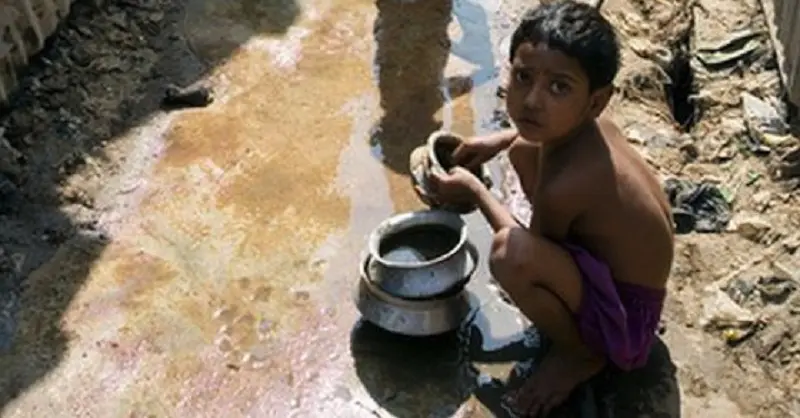
Bhati Dilwan Pakistan
One of the many production plants for manufacturing Nestlé’s bottled water is located in the small community of Bhati Dilwan in Pakistan. As a result of the exploitation of water supplies in this place, the local population suffers from illnesses, filth and lack of water in the midst of a natural abundance of water.
False concern for eco-standards
Contrary to ethical standards, Nestle is doing so-called greenwashing. Instead of complying to environmental standards, with its advertisements it’s falsely presenting itself to care for the environment. In other words, it only hides the pollution it causes, instead of truly caring about it.
Hence, the advertisement that the water that Nestle sells in bottles is completely recycled is false. Bottled water is environmentally the most responsible consumer product in the world – reads one of Nestlé’s advertisements in Canada. But investigations of environmental protection organizations show that a great part of those bottles end up in communal waste and are never recycled.
In 2018 alone, Nestle is responsible for the production of almost two million tons of plastic packagings, of which most cannot be recycled or used again.
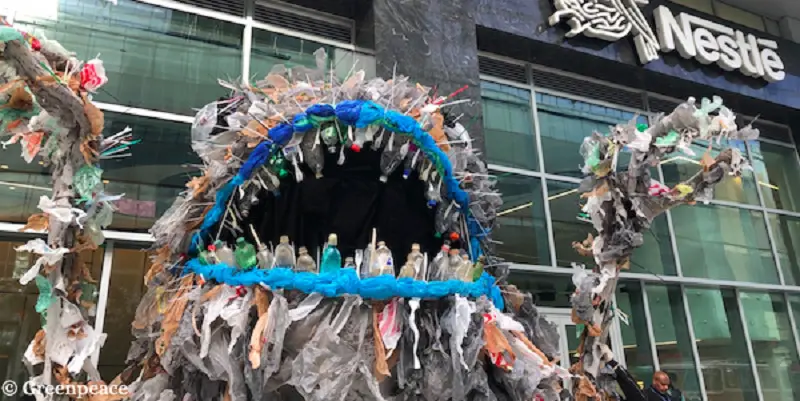
Greenpeace protest in front of Nestle headquarters in the United States, 2019
Exploitation of rainforests
In the African countries of Ivory Coast and Ghana, Nestle has caused serious deforestation. Nestle, like other chocolate manufacturers such as Hershey and Mars, uses cocoa that comes from illegal exploitation and trafficking of the fruits of these plants in protected areas.
It’s estimated that rainforests in Ivory Coast have fallen to just 4% now, which, among else, poses a great risk also to diversity.
“Price fixing” of chocolates
Chocolate manufacturing companies, including Nestle, were part of a five-year investigation by Canadian authorities that was disclosed in 2012. According to the findings of the investigation, the companies “fixed” the price of chocolate and thus violated several laws that protect consumers from market monopolization. The court dismissed these charges in 2015.
Still, symptomatic is the payment of 6.5 million euros in damages that Nestle paid in a lawsuit with private plaintiffs who sued the company for fixing the prices of chocolates.
Melamine in milk powder scandal
The scandal from 2008, when it was revealed that Nestle and other companies had been using impermissible levels of melamine in milk powder manufactured in China, is well-known. Melamine (C3H3N6) is a nitrogen-based ingredient that is a type of plastic. It had been used to increase the amount of proteins in the product. The same year, Taiwan banned the sale of Nestlé’s milk powder made in China.
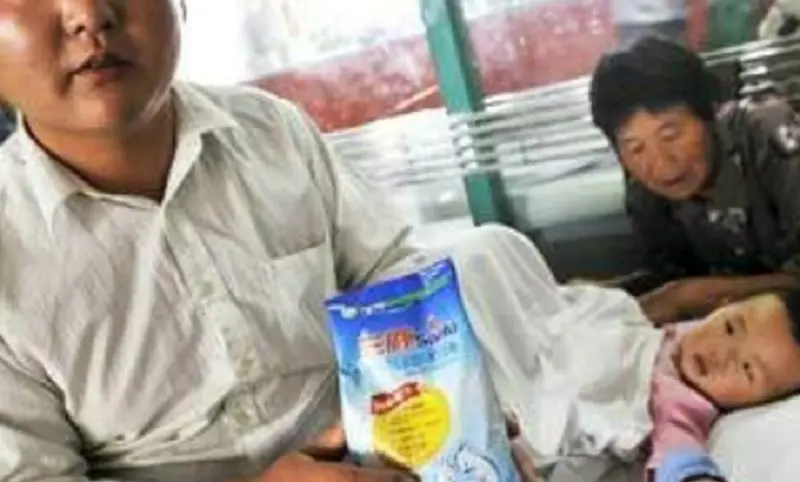
Babies suffer from the problematic ingredients of Nestlé’s milk powder made in China.
At one time, TV France 24 presented the reports of Chinese media on the deaths of two babies due to poisoning with the problematic ingredients of Nestlé’s milk powder. The scandal erupted after “whistleblowers” in New Zealand alerted about the situation.
“Principled” trade with Mugabe
Nestle bought milk from the farms that Zimbabwean dictator Robert Mugabe had seized, even though this country was under international sanctions. Again, out of “principled” positions, not to harm the people, not to lose their job.
Scandals with false information on labels
In the United States, Columbia and Poland, in the period from 2002 to 2017, there were multiple scandals related to false information on the labels of Nestlé’s products, which is unethical, and even dangerous behavior.
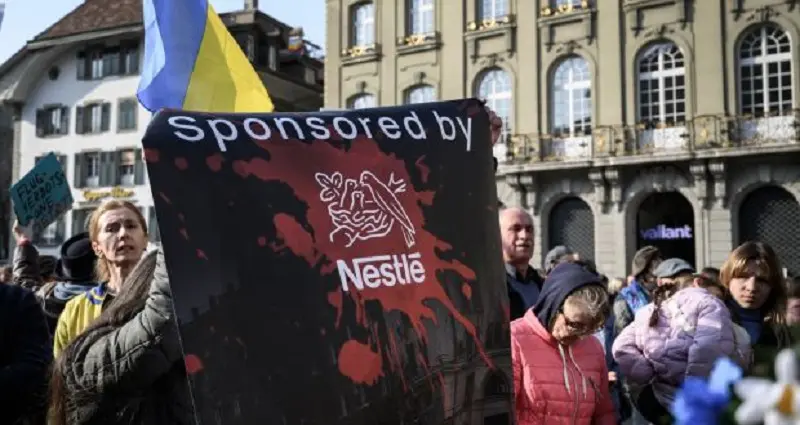
Protests against the Russian aggression against Ukraine, Bern, March19, 2022
“Principled” and “without profits” in Russia as well, in the midst of the invasion of Ukraine
Nestle remains to work in Russia, despite the sanctions that the democratic countries and large businesses are imposing, as a response to the brutal aggression against Ukraine. Nestle is defending its decision to remain in Russia with the “arguments” that it will not profit from its operation there and that it will keep active only the operations for basic products.
Ukrainian President Volodymyr Zelensky called on the Swiss company in his online speech to demonstrators in the capital of Switzerland, Bern, on March 19, pointing out the discord between its slogan “good food, good life” and its actions.
Business works in Russia even though our children are dying and our cities are being destroyed”, said Zelensky in his online address before demonstrators in Bern.
By: Xh. Deralla
Material used: New York Times, Listverse, The Irish Times, Wikipedia – The Dark Side of Chocolate, Wikipedia – Nestlé, Confectionery News, Business and Human Rights Resource Center, Greenpeace, France 24 and other.
Full or partial use of this text is permitted under Creative Commons 4.0 (by citing the source). Downloading the photos is a responsibility of the Editorial Offices downloading the material.
Translation: N. Cvetkovska



